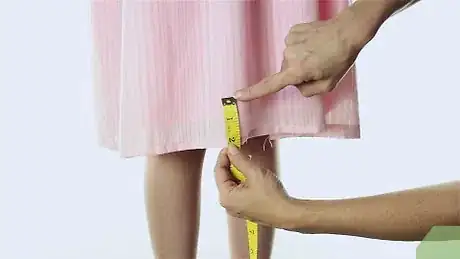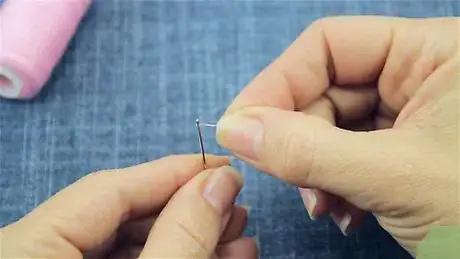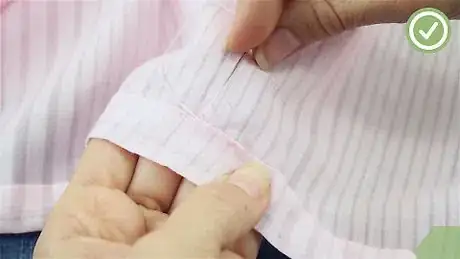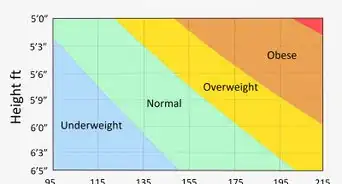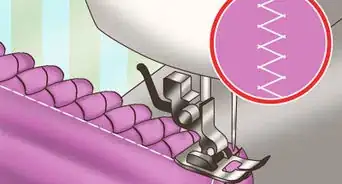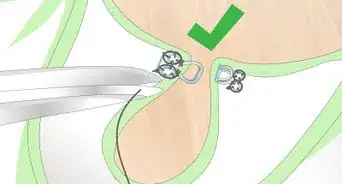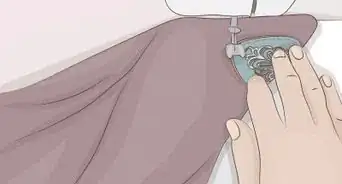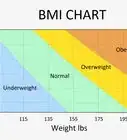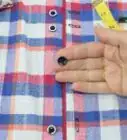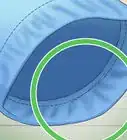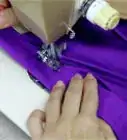This article was co-authored by Kpoene Kofi-Bruce and by wikiHow staff writer, Jessica Gibson. Kpoene Kofi-Bruce is a tailor, couture wedding gown designer, and the Creative Director of Mignonette Bridal and Ette the Wedding Tailor in Chicago, Illinois. With nearly two decades of experience as a wedding gown designer, small business owner, and vintage sewing enthusiast, Kpoene specializes in wedding gown design and the social history of wedding dresses. She received a BA in Creative Writing from Middlebury College and studied the business of fashion at the Fashion Institute of Technology. She is also a graduate of the Goldman Sachs 10KSB program and the Chicago Fashion Incubator and has written about wedding fashion for Jezebel, Catalyst, the Sun Times, and XO Jane.
There are 13 references cited in this article, which can be found at the bottom of the page.
wikiHow marks an article as reader-approved once it receives enough positive feedback. In this case, 92% of readers who voted found the article helpful, earning it our reader-approved status.
This article has been viewed 151,706 times.
If you've never hemmed a dress before, you might feel intimidated and unsure about where to start. It's actually pretty simple and you don't need a lot of sewing skills to do this well. In fact, you can complete this project in half an hour or less with just a needle and thread, using a blind stitch. When you turn your dress right side out, the stitches won't be visible at all.
Steps
Marking the Hemline
-
1Try on the dress to determine where you want the hem to be. Don't wear heels or shoes that will tilt you forward so the hemline is uneven. Instead, stand up stand with your feet flat on the floor so you can see where the dress falls. If you want to make the dress shorter, determine how much fabric you'd like to remove.[1]
- You can try on the shoes that you plan to wear with the dress in order to get an idea of where you want the hemline. However, take them off when you begin to mark the hemline or it may be slanted.
-
2Turn the dress inside out and use fabric chalk to mark the hemline. Take off the dress and turn it inside out before laying it flat on your work surface. Lay a ruler or measuring tape on the dress and make marks every 4 inches (10 cm) along the hemline.[2] Then, lay a ruler across the marks to line them up and draw along the hemline.[3]
- If you're struggling to mark an even hemline, put the dress back on while it's inside out and ask a friend to mark the line for you.
Advertisement -
3Draw another line 2 inches (5.1 cm) below the hemline. Use the chalk to make a parallel line below the hemline so you know where to actually cut the fabric. Once you've cut the fabric along this line, you'll fold it up so your hemline falls where you want.[4]
- If you forget to mark a lower cutting line, your finished hemline will be higher since you'll fold and sew the bottom edge of the fabric.
-
4Cut the excess fabric from the bottom of the dress if you're shortening the dress. Once you know how much fabric to remove, use scissors to carefully cut along the lower line you marked. Discard the excess fabric or save the scraps for another sewing project.[5]
- Skip this step if you're hemming the unfinished edge from a dress that you've already measured and cut.
Tip: Use sharp scissors for the straightest cut. Consider purchasing scissors that you only use for sewing projects and never use them to cut paper or cardboard, which could blunt them.
Hand-Stitching the Hem
-
1Fold the edge of the fabric over 2 inches (5.1 cm) and tuck the raw edge under. Take the raw edge of the fabric and bring it up so the bottom of the fabric lines up with the hemline that you marked. Then, fold the top 1⁄4 inch (0.64 cm) of the folded fabric under to hide the raw edge.[6]
- Although you don't have to tuck the raw edge under, your hemline will look more professional if the raw edge isn't visible.
Variation: For a completely no-sew option, cut a strip of fusible hem that's as long as the hemline. Place it under the folded hemline so it's sandwiched between the dress fabric. Then, set a warm iron onto the fabric for a few seconds so the strip bonds with the fabric. Keep pressing the iron down along the hemline so you melt the strip to the fabric.
-
2Pin the new hemline in place with sewing pins.[7] To prevent the folded edge from coming undone, stick a sewing pin through the folded fabric. Ensure that you insert the pins vertically so they secure the folds. Position the sewing pins about every 4 inches (10 cm) so the fabric doesn't slide around.[8]
-
3Thread a sewing needle. Cut a length of thread that's about 20 inches (51 cm) long and thread it through the eye of a sewing needle. Then, make a knot at the tail.[9]
- It's important to choose thread that perfectly matches the dress. This way, it won't be noticeable if someone sees the dress's inner hemline.
-
4Insert the needle into the fabric at the seam.[10] Keep the dress turned inside out so you're only sewing through the wrong side of the fabric. Find the vertical seam where the dress pieces are sewn together. Then, push your needle through a few of the fabric's surface loops so you're not inserting it from the bottom of the fabric. Pull the thread until you reach the knot at the end of the tail.[11]
- If you're working with thick fabric, insert the needle again and bring it through the thread's loop before pulling the thread tightly. This secures an extra knot.
-
5Push the needle through a stitch directly above the folded hem. Don't push the needle through the fabric or the stitch will be visible on the right side of the dress. Instead, slide your needle through a single loop on the surface of the fabric so you don't poke a hole onto the right side of the dress. Then, pull your needle to draw the thread through the stitch.[12]
- It might feel like you're not really sewing through the fabric, but as long as you pick up a single stitch, your hemline will hold.
-
6Pick up a stitch on the folded fabric below the hemline. Insert the tip of the needle into a single stitch below the fold. Ensure that you're sewing on the folded fabric instead of above it. Then, pull the thread so it secures the fold in place.[13]
- Pull gently so you don't make the hemline pucker.
-
7Work the blind hem stitch from right to left across the entire hemline. Move your needle about 1⁄4 inch (0.64 cm) to the left and insert it into a stitch on the fabric above the fold. Remember not to push through the fabric to the right side of the dress. Then, make another tiny stitch below it on the folded fabric. Repeat the blind hem stitch around the entire hem until you reach the seam where you started.[14]
- If you're left-handed, it's probably easier to sew from left to right.
-
8Trim the thread tail and turn the hemmed dress right side out. Once you reach the seam where you started hemming the dress, insert the needle and pull until you make a loop. Bring the needle through the loop to knot the thread. Do this 1 more time before trimming off the excess thread and turning the dress right side out.[15]
Expert Q&A
-
QuestionHow do you hem a prom dress fast?
 Kpoene Kofi-BruceKpoene Kofi-Bruce is a tailor, couture wedding gown designer, and the Creative Director of Mignonette Bridal and Ette the Wedding Tailor in Chicago, Illinois. With nearly two decades of experience as a wedding gown designer, small business owner, and vintage sewing enthusiast, Kpoene specializes in wedding gown design and the social history of wedding dresses. She received a BA in Creative Writing from Middlebury College and studied the business of fashion at the Fashion Institute of Technology. She is also a graduate of the Goldman Sachs 10KSB program and the Chicago Fashion Incubator and has written about wedding fashion for Jezebel, Catalyst, the Sun Times, and XO Jane.
Kpoene Kofi-BruceKpoene Kofi-Bruce is a tailor, couture wedding gown designer, and the Creative Director of Mignonette Bridal and Ette the Wedding Tailor in Chicago, Illinois. With nearly two decades of experience as a wedding gown designer, small business owner, and vintage sewing enthusiast, Kpoene specializes in wedding gown design and the social history of wedding dresses. She received a BA in Creative Writing from Middlebury College and studied the business of fashion at the Fashion Institute of Technology. She is also a graduate of the Goldman Sachs 10KSB program and the Chicago Fashion Incubator and has written about wedding fashion for Jezebel, Catalyst, the Sun Times, and XO Jane.
Couture Bridal Designer Hemming isn’t simple, so give yourself some time! Stand on a tall box, platform, or table wearing the shoes you're planning to wear with the dress. Look straight ahead as you pin. Going layer by layer, pin horizontally around the hem where the fabric touches the floor (or where the client wants the dress to sit). Double-check with a ruler or measuring tape and the end to ensure it is even.
Hemming isn’t simple, so give yourself some time! Stand on a tall box, platform, or table wearing the shoes you're planning to wear with the dress. Look straight ahead as you pin. Going layer by layer, pin horizontally around the hem where the fabric touches the floor (or where the client wants the dress to sit). Double-check with a ruler or measuring tape and the end to ensure it is even.
Things You'll Need
- Fabric chalk
- Measuring tape or ruler
- Needle
- Thread
- Scissors
- Straight pins
References
- ↑ https://sewguide.com/skirt-length/
- ↑ Kpoene Kofi-Bruce. Couture Bridal Designer. Expert Interview. 28 January 2021.
- ↑ https://sewguide.com/how-to-hem/
- ↑ https://youtu.be/d42VtoMZcbo?t=90
- ↑ https://youtu.be/EfsCU-yJVaA?t=31
- ↑ https://youtu.be/89WaboSZn9A?t=157
- ↑ Kpoene Kofi-Bruce. Couture Bridal Designer. Expert Interview. 28 January 2021.
- ↑ https://sewguide.com/blind-hem-stitch/
- ↑ https://youtu.be/d42VtoMZcbo?t=142
- ↑ Kpoene Kofi-Bruce. Couture Bridal Designer. Expert Interview. 28 January 2021.
- ↑ https://youtu.be/d42VtoMZcbo?t=164
- ↑ https://youtu.be/d42VtoMZcbo?t=248
- ↑ https://youtu.be/d42VtoMZcbo?t=237
- ↑ https://youtu.be/d42VtoMZcbo?t=354
- ↑ https://youtu.be/jlHyqT4K-p0?t=155
